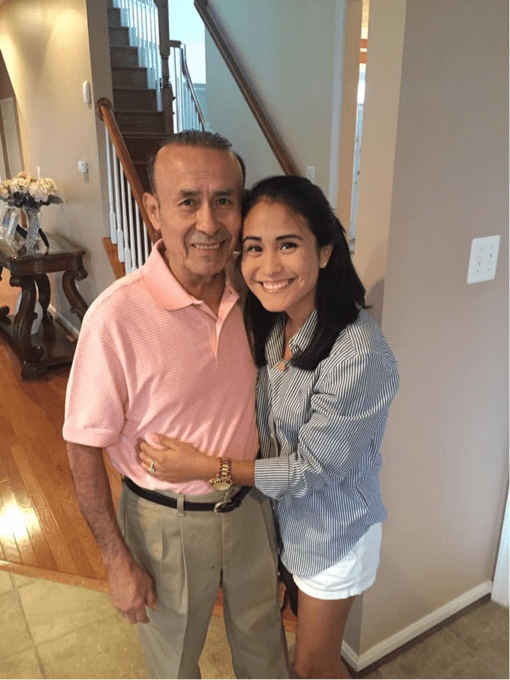My parents came to the U.S. about 30 years ago from Lima, Peru. They worked so hard to give my brother and me the life we have now. My parents worked at grocery stores, but they would also clean office buildings part-time and bring us along. My dad was always either vacuuming or taking out the trash. But we noticed he had started becoming forgetful. He wouldn’t put the trash bin back where it was supposed to be, or he’d misplace the vacuum.
By the time I got to high school, he was being pulled over by the police a couple times a month. He would forget where he was going, and when police stopped him, he couldn’t remember where he lived. He would come home and tell us his head was just spinning and he didn’t know what happened. Eventually, he lost his driver’s license.
 Lisette Carbajal and dad Jose in 2011, during my first semester at university. It was heartbreaking. We were very close growing up, and we didn’t have the same relationship anymore. It’s like his spirit started slowly fading away.
Lisette Carbajal and dad Jose in 2011, during my first semester at university. It was heartbreaking. We were very close growing up, and we didn’t have the same relationship anymore. It’s like his spirit started slowly fading away.
RELATED: 7 Ways to Protect Your Memory
I would drive home on the weekends to give my mom a break from caring for my dad. I helped with everything from feeding him to brushing his hair to helping him brush his teeth. I think the hardest things were helping him shower and go to the bathroom. It wasn’t something I thought I’d be doing in my 20s. It was a shock for me to have to take care of him in that capacity. He often didn’t recognize me and didn’t know I was trying to help him—or he thought I was trying to hurt him.
After I graduated, I had to balance building a resume with taking care of my dad. I couldn’t apply to jobs outside of Virginia; I had to stay near my parents to help my father. I got a job in state government in Richmond. Even though my mom had help from my brother and his wife, I had a sense of guilt: Was I being selfish pursuing a career that wasn’t going to help my parents? Should I not take the job?
Even after I took the job, sometimes I would have to drop everything and drive home. Sometimes my dad was found wandering or wouldn’t listen to my mom. If he didn’t have a way to get to a doctor’s appointment, I would call in sick and drive him.
I felt like I couldn’t relate to friends and peers. They didn’t face the barriers I faced. I knew in the back of my head every decision I made would impact my dad and my mom. I had to be more careful with decisions I made for my future. I didn’t have the flexibility my friends had to pursue jobs in Atlanta or New York. I didn’t feel like I had anyone to talk to about going through this with a parent while still being in your 20s.
RELATED: 25 Signs and Symptoms of Alzheimer's Disease
My dad didn’t really know what was going on at my graduation from college or when I got my masters degree. I know he would have been really proud. I used to dance, and at one performance, before he started showing Alzheimer’s symptoms, he ran up on stage to tell me how proud of me he was and how happy he was for me.
I know he would have done the same at my graduations. I know he would have adored my fiancé. I think about not being able to walk down the aisle at my wedding next year with my dad by my side just about every day. I know he would have been just as thrilled as he was at my dance performance.
 Lisette and Jose Carbajal with Graham
Lisette and Jose Carbajal with Graham
It’s hard to share the story. It’s hard to be brutally honest about what you witness as a caregiver at my age. It can be traumatizing, especially for someone who is not prepared. I reflect back on those experiences, and I remind myself I’m not the only millennial going through this. I’ve found comfort in learning about other folks’ stories—especially other daughters taking care of their fathers—so I hope sharing my story helps too.
If you are a young person taking care of someone with Alzheimer’s, remember to take time for yourself. Oftentimes, I need to step back and take a break. It’s difficult, because you feel the need to help and care for a loved one 24/7. But if you don’t take care of yourself, how will you be able to take care of anyone else?
